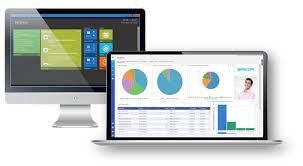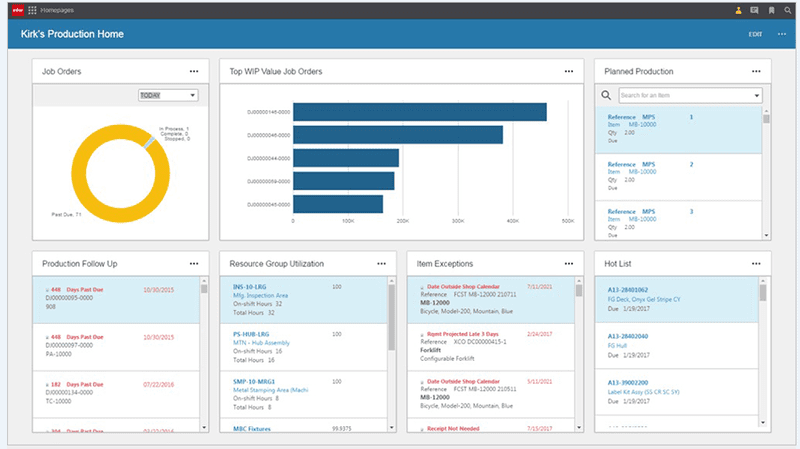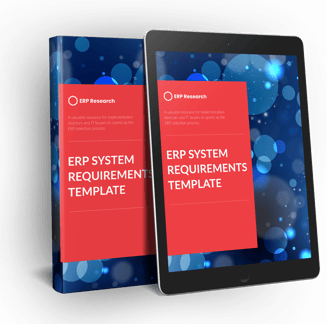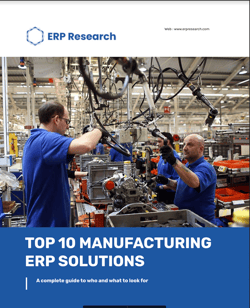Epicor versus Infor. Which is the best ERP solution for your business? In this blog post, we'll put two of the biggest names to the test and look at functionality, cost, industry fit and more.
Introduction to Epicor & Infor
Epicor ERP
Epicor ERP is a comprehensive enterprise resource planning solution designed to enhance the performance and profitability of businesses. It is renowned for its robust capabilities in manufacturing, distribution, retail, and service industries. The system helps organizations streamline their operations, reduce costs, and improve efficiencies. It offers modules for financial management, supply chain management, production management, sales, customer relationship management (CRM), and project management, among others.

Infor ERP
Infor ERP is an integrated enterprise resource planning system built to align with companies' core business operations. Infor ERP is widely used across various industries, including manufacturing, healthcare, distribution, and the public sector. It provides end-to-end solutions for financials, supply chain management, production management, human capital management, and more. Infor ERP is known for its industry-specific capabilities and user-friendly interface.

Quick Comparison
-
Industry Focus: Epicor is best known for its strong presence in the manufacturing sector. It provides end-to-end tracking of all production processes, making it a favorite among manufacturing industries. On the other hand, Infor ERP is recognized for its versatility, serving a broader range of industries with industry-specific solutions.
-
User Interface: Both ERP systems focus on providing a user-friendly interface, but Epicor is often praised for its intuitive design, which can make it easier to implement and use.
-
Customization and Scalability: Both systems offer high customization and scalability. However, Epicor is often seen as more straightforward to scale and customize, making it a good fit for businesses of all sizes. Infor ERP also scales well but is generally considered better suited for larger enterprises due to its wide range of functionalities.
-
Cloud Deployment: Both Epicor and Infor offer cloud-based solutions, with Infor having a stronger emphasis on cloud deployment through its CloudSuite offerings.
Functionality & Modules
Epicor ERP Functionality & Modules
-
Financial Management: Epicor's financial management module integrates all financial data into a single database, ensuring real-time updates and accurate reporting. Functions include general ledger, accounts payable, accounts receivable, cash management, risk management, tax management, financial planning, and forecasting.
-
Supply Chain Management: Epicor's SCM suite helps streamline purchasing, manufacturing, inventory, shipping, and customer delivery processes. It also includes comprehensive features such as supplier relationship management and supply chain execution for logistics and shipping management.
-
Production Management: Epicor excels in the manufacturing industry, offering robust production management capabilities. The software provides end-to-end tracking of all production processes, job management, material requirements planning (MRP), quality assurance, and advanced MES.
-
Human Capital Management: Epicor's HCM suite includes a comprehensive set of HR management features, like recruitment, benefits administration, employee performance management, and time and attendance. However, compared to Infor, it may not offer the same level of detail.
-
Sales and CRM: Epicor CRM offers tools for sales management, marketing automation, customer service, and more. It also provides tools for customer self-service, helping businesses improve customer experiences and reduce service costs.
-
Project Management: Epicor's project management module is comprehensive, allowing companies to plan, execute, and evaluate projects efficiently. It includes features such as project planning, scheduling, resource allocation, and project accounting.

Download our full guide to Epicor
Infor ERP Functionality & Modules
-
Financial Management: Infor's financial management capabilities are robust, offering modules for general ledger, accounts payable, accounts receivable, cash management, financial planning, budgeting, and more. It also provides industry-specific financial management capabilities.
-
Supply Chain Management: Infor provides SCM solutions tailored to specific industries, including demand and supply chain planning, inventory management, procurement, and warehouse management. Infor also has a Global Trade Management module for companies involved in international trade.
-
Production Management: Infor's production management module offers capabilities like product lifecycle management, MRP, shop floor control, and quality management.
-
Human Capital Management: Infor's HCM is a standalone product that can be integrated with its ERP solutions. It provides comprehensive tools for HR management, workforce planning, talent management, learning management, and HR analytics.
-
Sales and CRM: Infor's CRM module includes sales management, customer service, contact management, and more. It also offers modules for salesforce automation and customer interaction, and it provides tools for marketing campaign management.
-
Project and Resource Management: Infor's project management module helps manage all aspects of project lifecycle from planning and budgeting to execution and analysis. It also includes resource management and project costing features.
%20Ebook.png?width=200&height=282&name=Download%20the%20Infor%20CloudSuite%20Industrial%20(SyteLine)%20Ebook.png)
Download our full guide to Infor
Industry Suitability
Epicor ERP Industries
-
Manufacturing: Epicor is particularly strong in the manufacturing sector, offering specific solutions for discrete manufacturing, metal fabrication, automotive, aerospace and defense, industrial machinery, and more. The system supports various manufacturing modes including make-to-order (MTO), make-to-stock (MTS), engineer-to-order (ETO), and more.
-
Distribution: Epicor's distribution solutions support end-to-end supply chain management, which can be beneficial for wholesale distributors in sectors such as electrical, plumbing, HVAC, and more.
-
Retail: Epicor offers retail management software that caters to hard goods retailers of all sizes, from large chains to small businesses.
-
Service: For the services sector, Epicor provides service management solutions that can help businesses manage, schedule, and deploy field service and maintenance operations efficiently.
Infor ERP Industries
-
Manufacturing: Like Epicor, Infor ERP also caters to the manufacturing sector, with solutions for discrete manufacturing, process manufacturing, and mixed-mode manufacturing. Infor has specific solutions for sectors such as automotive, industrial manufacturing, high tech, and more.
-
Healthcare: Infor has specific solutions for the healthcare industry, offering a comprehensive suite of software designed to handle clinical, financial, and operational needs of healthcare organizations.
-
Public Sector: Infor provides ERP solutions for public sector organizations like government agencies, municipalities, public safety agencies, and more, to help manage resources more effectively.
-
Hospitality: Infor has specific solutions for the hospitality industry, including modules for property management, revenue management, and more.
-
Retail: Infor offers a retail ERP suite with modules that cover every aspect of the retail workflow, from merchandise planning and human capital management to supply chain and financials.

Evaluating ERP Software?
Download our ERP Requirements Template
Implementation
Epicor Implementation Process:
Epicor's implementation process is generally known for its flexibility. Their approach usually consists of several key phases, such as project preparation, business blueprinting, realization, final preparation, and go-live & support. Epicor also offers the Signature Implementation Methodology, which is a five-stage process that includes:
- Plan: Project preparation and planning.
- Analyze: Analyze and document business processes and requirements.
- Design: Configure the system and define user roles.
- Validate: Perform system testing and end-user training.
- Deploy: Go-live and continuous improvement.
Epicor also provides industry-specific strategic consultation and a range of training and support resources.
Infor Implementation Process:
Infor has a similar structured approach to implementation and offers the Infor Implementation Accelerator, which provides pre-configured, industry-specific processes to speed up implementation. Their process typically involves the following stages:
- Project preparation: Define the scope and objectives of the project.
- Business process mapping: Identify and document the company's business processes.
- Implementation: Install the software and configure it to match the company's processes.
- Testing: Validate that the system works as expected.
- Deployment: Roll out the system to all users and provide necessary training.
Infor also offers Infor Services, a dedicated team to support the implementation process and Infor Campus, a comprehensive learning platform.

Download the Top 10 Manufacturing ERP Report
User Interface
Epicor ERP User Interface:
Epicor ERP is known for its simple and intuitive interface. Epicor's approach is to ensure that all relevant information is accessible with minimal clicks, aiming to make the user interface (UI) as efficient as possible.
The Epicor ERP UI is built on modern design principles, making it visually appealing and easy to navigate. The dashboard can be customized to suit individual user preferences, allowing users to tailor it to their specific needs. This customization includes the ability to create shortcuts, favorites, and even personalized workflows.
Epicor ERP also provides real-time analytics and KPIs directly on the dashboard, giving users instant visibility into their operations.
Infor ERP User Interface:
Infor ERP places a heavy emphasis on the user experience. Infor's UI, often referred to as Infor OS (Operating Service), incorporates modern design aesthetics and uses a consumer-grade interface, making it visually attractive and intuitive to navigate.
Infor ERP's interface is highly customizable, allowing users to adjust their dashboards and workflows based on their roles and preferences. It's designed to provide a unified user experience across various Infor applications, which helps to keep the look and feel consistent if your organization uses more than one Infor product.
Infor ERP also includes advanced analytics and business intelligence capabilities that are seamlessly integrated into the interface, allowing users to access real-time data and insights.
Both Epicor and Infor have committed considerable resources to creating an interface that is user-friendly, visually pleasing, and highly customizable. Epicor's UI is often praised for its straightforward and efficient design, making it particularly suitable for users who prefer a clean, no-nonsense interface.
On the other hand, Infor's UI stands out for its modern, consumer-grade aesthetics and consistent design across various applications. If your organization values an interface that closely resembles consumer applications and prioritizes aesthetics, then Infor might be the preferred choice.
Onboarding, Learning & User Adoption
Epicor:
Epicor offers a comprehensive approach to training and user adoption. The company provides Epicor University, a learning platform with a wide range of resources. This includes instructor-led training, online courses, and a variety of learning materials like user manuals, how-to guides, and FAQs.
Epicor's user interface is also designed with usability in mind, and the company focuses on creating intuitive workflows to reduce the learning curve.
To aid user adoption, Epicor provides resources for change management, user acceptance testing, and a range of post-implementation support. Additionally, Epicor's active user community allows for peer-to-peer assistance and knowledge sharing.
Infor:
Infor provides Infor Campus, a learning platform with a mix of self-paced, web-based training, and instructor-led classes. It covers a broad range of topics to help users understand the software and its functionalities. Infor Campus offers a customizable learning experience where users can select the learning path most relevant to their roles and responsibilities.
Infor's user interface is designed to be user-friendly and intuitive, mirroring the look and feel of modern consumer-grade applications, which can make it easier for users to understand and navigate.
Infor also offers a dedicated team for implementation support and resources for change management to facilitate user adoption.
History
Epicor History:
Epicor was founded in 1972 as a provider of an integrated accounting software for the retail sector. Over the years, Epicor expanded its product offering to cover ERP, CRM, and supply chain management (SCM), primarily focusing on the manufacturing, distribution, retail, and service industries.
Epicor has gone through numerous mergers and acquisitions over its history, each contributing to the expansion and refinement of its software offerings. For instance, it acquired Spectrum Computer Corporation in 2005, a move that brought additional strength to its manufacturing software suite.
In 2012, Epicor merged with Activant Solutions, a leading technology provider of business management software solutions, to expand its position in the manufacturing, distribution, retail, and services sectors.
Throughout its history, Epicor has emphasized the usability of its software, working to ensure it's intuitive and easy to use.
Infor History:
Infor was founded in 2002 under the name Agilsys in Malvern, Pennsylvania. It started with 1,300 customers and became Infor Global Solutions following several acquisitions, including MAPICS, an ERP software company that strengthened Infor’s position in the manufacturing industry.
Infor followed an aggressive acquisition strategy in its early years, acquiring over forty other software companies, significantly broadening its product portfolio and customer base. These acquisitions have enabled Infor to offer highly specific software suites for a variety of industries.
In 2010, Infor hired former Oracle president Charles Phillips as CEO, who dramatically shifted the company's strategy towards developing industry-specific applications and user-friendly interfaces. The company also introduced Infor CloudSuite, a group of cloud-based applications built for various industries.
Over the years, Infor has continued to improve its product offerings, providing solutions that offer deep industry functionality and are available in the cloud.
Cost
Determining the exact cost of an ERP system like Epicor or Infor can be complex due to a variety of factors. These factors include:
-
Deployment Model: The costs will differ depending on whether you choose a cloud-based (SaaS) or on-premises solution. Typically, on-premises solutions require a larger upfront investment for hardware and installation but less ongoing costs, whereas cloud-based solutions have a lower upfront cost but recurring subscription fees.
-
Number of Users: Both Epicor and Infor ERP solutions often price based on the number of users who will be using the software. The more users, the higher the cost.
-
Modules and Features: The range of modules and features that you choose to implement will also affect the price. Additional modules often come at an extra cost.
-
Customization: If the software needs to be customized to suit your specific business requirements, it can add to the total cost.
-
Implementation and Training: Implementation costs, including data migration, system setup, and user training, can also add significantly to the overall cost.
-
Maintenance and Support: Depending on the vendor, there might be additional costs for ongoing support and maintenance, updates, and upgrades.